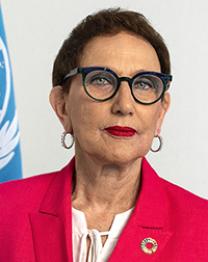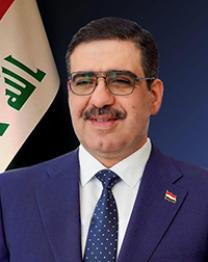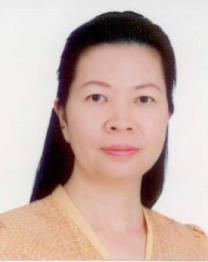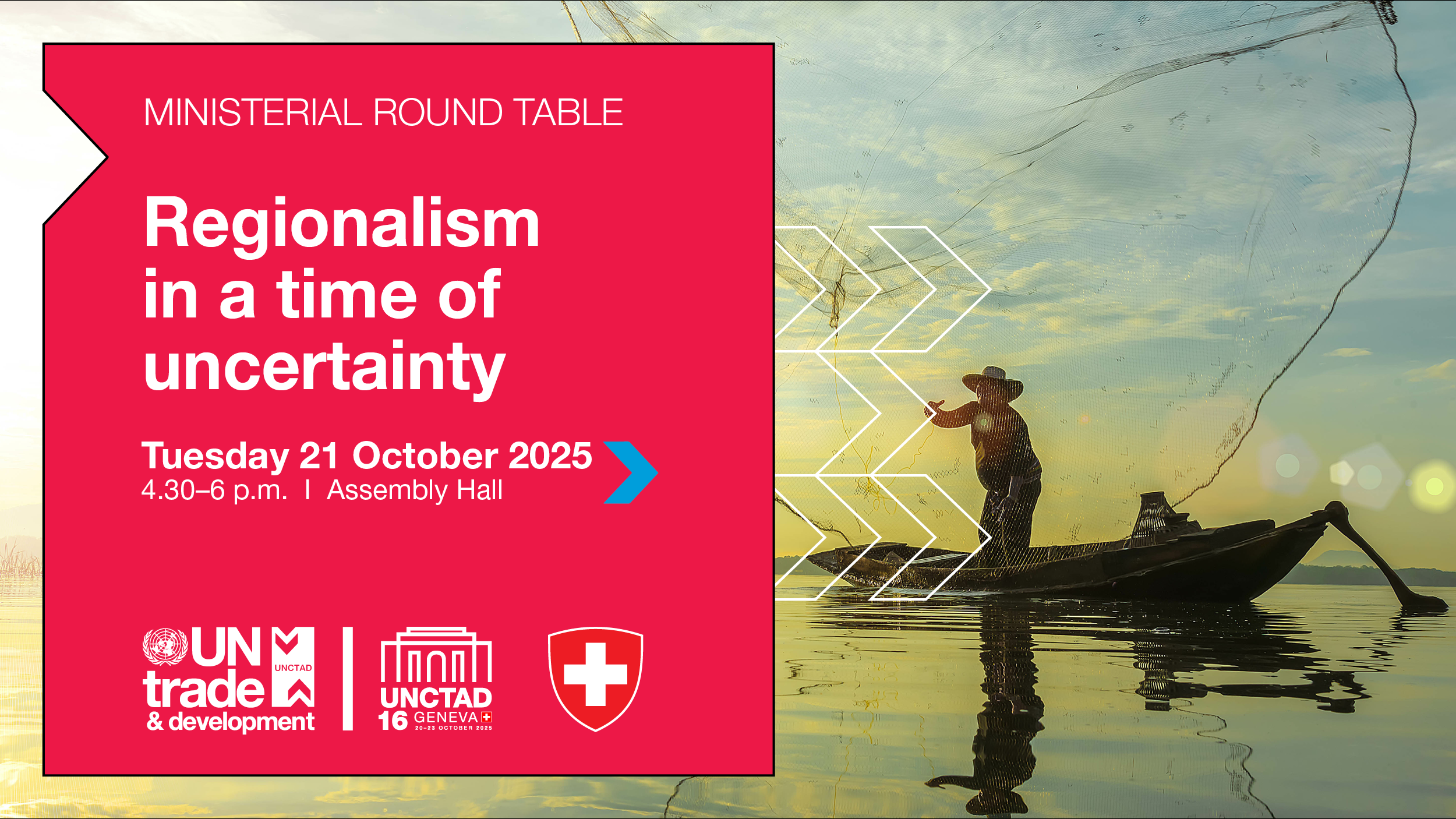
Watch the ministerial roundtable on regionalism
Multilateral negotiations face increasing fragmentation driven by geopolitical tensions and the rise of unilateral trade-restrictive measures. In this challenging environment, regional and megaregional initiatives offer a pragmatic and flexible alternative, particularly for countries seeking to maintain momentum on trade liberalization and economic cooperation. Originally conceived as complementary to multilateralism, regional trade agreements provide dynamic platforms for cooperation among geographically and economically like-minded countries.
They can contribute to expanding markets, attracting investment, creating jobs and fostering inclusive development. The long-standing support of UNCTAD for regional integration, including through initiatives such as the African Continental Free Trade Area Agreement, the Association of Southeast Asian Nations and the Global System of Trade Preferences, continues to be instrumental in advancing on this path.
Discussions at this round table will explored how open regionalism can respond to the present trade challenges through offering the predictability and certainty needed for sustainable economic growth. To guide the future work of UNCTAD on harnessing regionalism for development, discussions drew on diverse regional experiences, distilled key lessons learned and examined how integration efforts can respond to emerging priorities such as the digital economy and environmental sustainability, while complementing and reinforcing multilateral initiatives.
Programme
Opening remarks: Rebeca Grynspan, Secretary-General, UN Trade and Development (UNCTAD)
Panel 1: Regionalism as a response to trade policy uncertainty
Questions
- How can open regionalism provide the predictability and certainty that trade and investment require in the current global context of increasing unilateralism and stalled multilateral negotiations?
- Which lessons can be drawn from existing regional and mega-regional trade agreements in promoting inclusive and sustainable development, particularly for developing economies, and how can such agreements be made more effective towards achieving this objective?
Speakers
- Ryad Mezzour, Minister of Industry and Trade, Government of Morocco
- Nazar Halnazarovich Agahanov, Minister of Trade and Foreign Economic Relations, Government of Turkmenistan
- Tekreth Kamrang, Secretary of State, Ministry of Commerce, Kingdom of Cambodia
Panel 2: Regional integration as a building block for multilateralism
Questions
- How can regionalism complement multilateralism and how can developing countries use regional platforms to influence global trade norms more effectively?
- Which key elements should modern regional trade agreements include to ensure that they are effective tools for economic integration, resilience and inclusive growth?
- What role can UNCTAD play in helping developing countries devise regional trade agreement models in support of development?
Speakers
- Lyonpo Namgyal Dorji, Minister for Industry, Commerce and Employment, Bhutan
- Atheer Dawood Salman Al Ghrairi, Minister of Trade, Iraq
- Regina Akoth Ombam, Principal Secretary, State Department for Trade, Kenya
Moderator: Luz Maria de la Mora, Director of the Division on International Trade and Commodities, UN Trade and Development (UNCTAD)
Format: Davos-style
In September 2021, Rebeca Grynspan was appointed Secretary-General of the United Nations Conference on Trade and Development (UNCTAD), becoming the first woman to lead the organization in its 60-year history.
Rebeca Grynspan, an economist and former Vice President of Costa Rica, is an experienced leader of international institutions with a substantive track record in government, UN diplomacy, economic policy and multilateral cooperation at the global level.
Prior to joining the United Nations, she was Vice President of Costa Rica and held cabinet positions as Minister of Housing, Minister Coordinator of Economic and Social Affairs and Deputy Finance Minister.
Previously, she served as Secretary-General of the Ibero-American Conference (2014–2021), chairing regional summits of Heads of State and Government; United Nations Under-Secretary-General and Associate Administrator of the United Nations Development Programme (UNDP); and UNDP Regional Director for Latin America and the Caribbean. She was a member of the UN Commission for the Reconstruction of Haiti, representing the UN Secretary-General.
At UNCTAD, Grynspan has been at the centre of critical negotiations to address global trade and development challenges. She played a decisive role in the successful Black Sea Grain Initiative brokered between the UN, Türkiye, the Russian Federation and Ukraine, which enabled the safe export of over 32 million tons of grain, lowered global food prices by 22% and prevented millions from falling into food insecurity. She also leads the UN Global Crisis Response Group on food, energy and finance, and has represented the UN in G20 summits.
Her leadership has been recognized widely. In 2024, she received the Doha Negotiator of the Year Award for spearheading UN efforts to restore Black Sea trade routes. In 2025, Spain’s Ministry of Foreign Affairs, European Union and Cooperation awarded her the inaugural Isabel Oyarzábal Women in Multilateralism International Prize for her contribution to multilateralism.
Ms. Grynspan holds degrees in economics from the University of Costa Rica and the University of Sussex, and honorary doctorates from several European universities.
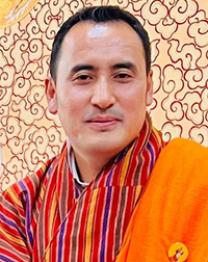
Lyonpo Namgyal Dorji serves as the Minister for Industry, Commerce and Employment (MoICE) in the Royal Government of Bhutan, following his appointment by His Majesty The King on 28 January 2024. He is also a Member of Parliament in the National Assembly of Bhutan, representing the Kabji-Talo constituency in Punakha.
He holds a Master’s degree in International Relations and Diplomacy from the Coral Bell School of Asia Pacific Affairs at the Australian National University, a Postgraduate Diploma in Public Administration from the Royal Institute of Management, and a Bachelor of Arts (Honours) in English from the University of Delhi.
Before entering politics in 2022, he served for over 12 years in the Ministry of Foreign Affairs, where he held various diplomatic and policy roles including 4 years of service at the Permanent Mission of Bhutan to the United Nations in New York.
Outside of his official responsibilities, he enjoys reading, long hikes, and spending quality time with his family and three children.
Atheer Dawood Salman Al Ghurairi is an Iraqi politician who has been serving as the Minister of Trade of Iraq since 2022.
Before that, he held the following positions:
- Director Manager of State Company for Grains, processing from (2021-2022)
- Director Manager of State Company for Central Markets (2020-2021)
- Deputy Director General of the Planning and Follow-up Department (2018-2020)
He holds a PhD in Economics.
Ryad Mezzour is a Moroccan politician and engineer. He has served as Minister of Industry and Trade since his appointment on 7 October 2021.
Before that, he served as chef de cabinet of the Ministry of Industry, Trade, Green and Digital Economy. From 2013 to 2019, Mezzour served as director of the cabinet of the president for the Moroccan Economic, Social and Environmental Council.
Between 2006 and 2009, Mezzour held several management positions at SOMED. He was appointed General Manager of Suzuki Morocco in 2009.
After finishing his master's degree, he worked as a financial services consultant for Deloitte from 2000 until 2003. In 2003, he returned to Morocco and was the general manager of Budget Rent a Car. From 1996 until 1998, Mezzour worked at ABB in Switzerland as a research and development engineer.
Mr. Mezzour holds a Bachelor in Mechanical Engineering (1996) and a Master in Business Management (2000) from the Swiss Federal Institute of Technology.

Mr Nazar Agahanov, appointed Minister of Trade and Foreign Economic Relations of Turkmenistan in July 2025, previously served as Deputy Minister and Head of Foreign Economic Relations.
With experience in the Presidential Office (2016–2024), he holds degrees from MGIMO and the Diplomatic Academy of Russia.
Ms. Tekreth Kamrang currently serves as the Secretary of State at the Ministry of Commerce, Royal Government of Cambodia.
During the past 17 years, she has been involved in and managed the organization in the areas of international cooperation, Aid for Trade Programs, trade policy formulation, and trade finance. In this capacity, she has played important roles in enhancing Cambodia’s trade development and integration into the global market.
She has actively engaged in strengthening and diversifying Cambodia’s trade relations with other countries. She has recently engaged in trade negotiation with the United Arab Emirates for the Establishment of the Comprehensive Economic Partnership Agreement, under her role as Chief Negotiator. She has been the Co-Chair of various Joint Economic Committees to strengthen trade and economic development with other countries.
She received her Medical Doctor degree from the University of Health Science, Cambodia in 1996. She received a Master Degree in Public Health Policy from the University of Oklahoma Health Science Center, United States in 2004. She also holds her PhD in Economics in Cambodia, received in 2025.
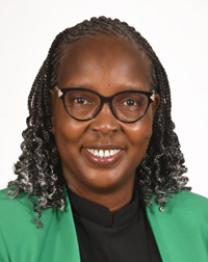
Ms. Regina Akoth Ombam is the Principal Secretary, State Department for Trade. Ms. Ombam is a distinguished economist and public policy expert with extensive experience in economic modeling, trade policy, transport economics, health financing and strategic planning. Her career spans roles in both national, regional and global institutions. As a former Regional Health Financing Expert at the East African Community (EAC) Secretariat, she played a pivotal role in advancing sustainable healthcare funding across member states in the African region. Her leadership as an EAC Health Financing Dialogue Facilitator saw her working alongside Ministers of Health and Finance to establish the region’s Health Financing Hub and advocate for increased domestic investments in health through high level health financing dialogues in the Regional Economic Communities ( EAC, SADC, IGAD, ECOWAS) in Africa. Previously, she served as Deputy Director for HIV Investments at Kenya’s National AIDS Control Council (NACC), where she was instrumental in mobilizing domestic and international resources for the HIV/AIDS program in the country as well as developing evidence based investment cases for health. Ms. Ombam also served as one of the Technical Experts at the Council of Governors Secretariat on matters Health Financing in the context of Devolution. Her advocacy efforts significantly influenced national, regional and global health financing frameworks and strengthened Kenya’s presence on global health platforms particularly when she served as the Vice Chair of the Technical Review Panel of the Global Fund and Advisor to the World Bank President and UNAIDS Executive Director on Sustainable Financing for Health. Ms. Ombam’s expertise extends across extensive macroeconomic and microeconomic analysis, implementation science, negotiations, results-based management and institutional governance. Her strategic insight has made her a key driver in enhancing trade policy, fostering public-private partnerships, and promoting economic integration across the continent, including engagements at the African Union, European Union and with other Bilateral partners. Ms. Ombam holds a Bachelor of Arts degree in Anthropology and a Master of Arts degree in Economics from the University of Nairobi and a Masters Degree in Public Administration from Columbia University. With a proven track record in economic policy and strategic planning her leadership at the State Department is instrumental in enhancing Kenya's trade environment, attract investment and strengthen economic ties both regionally and globally.
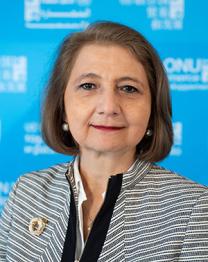
Luz Maria de la Mora is the Director of UNCTAD's Division on International Trade and Commodities. As a former Vice-Minister for International Trade and decades of government and private sector positions, Ms. de la Mora developed a career in international trade policy, negotiation, operations, and trade promotion.
During her tenure as Vice-Minister for International Trade of Mexico from 2018 to 2022, Ms. de la Mora led Mexico's trade and investment policy, overseeing fourteen free trade agreements with 51 countries. To bolster Mexico's development, she steered discussions in the World Trade Organization, the United States-Mexico-Canada Trade Agreement, Comprehensive and Progressive Agreement for Trans-Pacific Partnership, and Pacific Alliance, among others. She also coordinated policy dialogues and handled private sector consultations.
Ms. de la Mora holds a PhD in Political Science from Yale University, USA, a Master's degree in International Affairs from Carleton University, Canada, and a Bachelor's degree in International Relations from El Colegio de México, Mexico.
She is fluent in English and Spanish, and proficient in French.




